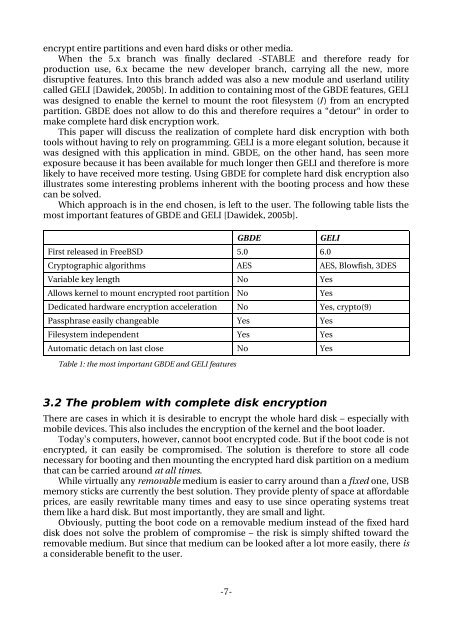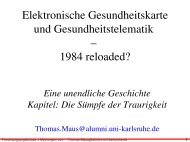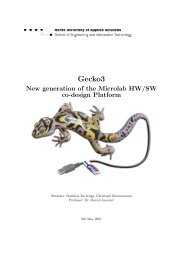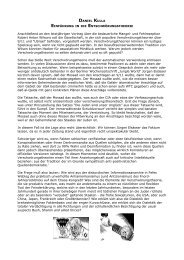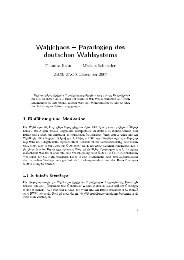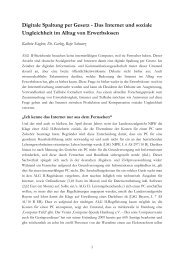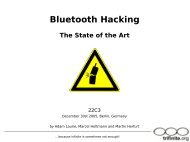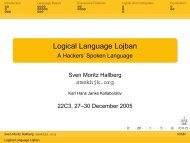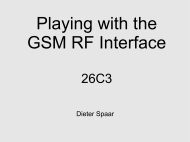Complete Hard Disk Encryption Using FreeBSD's GEOM Framework
Complete Hard Disk Encryption Using FreeBSD's GEOM Framework
Complete Hard Disk Encryption Using FreeBSD's GEOM Framework
You also want an ePaper? Increase the reach of your titles
YUMPU automatically turns print PDFs into web optimized ePapers that Google loves.
encrypt entire partitions and even hard disks or other media.<br />
When the 5.x branch was finally declared STABLE and therefore ready for<br />
production use, 6.x became the new developer branch, carrying all the new, more<br />
disruptive features. Into this branch added was also a new module and userland utility<br />
called GELI [Dawidek, 2005b]. In addition to containing most of the GBDE features, GELI<br />
was designed to enable the kernel to mount the root filesystem (/) from an encrypted<br />
partition. GBDE does not allow to do this and therefore requires a “detour“ in order to<br />
make complete hard disk encryption work.<br />
This paper will discuss the realization of complete hard disk encryption with both<br />
tools without having to rely on programming. GELI is a more elegant solution, because it<br />
was designed with this application in mind. GBDE, on the other hand, has seen more<br />
exposure because it has been available for much longer then GELI and therefore is more<br />
likely to have received more testing. <strong>Using</strong> GBDE for complete hard disk encryption also<br />
illustrates some interesting problems inherent with the booting process and how these<br />
can be solved.<br />
Which approach is in the end chosen, is left to the user. The following table lists the<br />
most important features of GBDE and GELI [Dawidek, 2005b].<br />
GBDE GELI<br />
First released in FreeBSD 5.0 6.0<br />
Cryptographic algorithms AES AES, Blowfish, 3DES<br />
Variable key length No Yes<br />
Allows kernel to mount encrypted root partition No Yes<br />
Dedicated hardware encryption acceleration No Yes, crypto(9)<br />
Passphrase easily changeable Yes Yes<br />
Filesystem independent Yes Yes<br />
Automatic detach on last close No Yes<br />
Table 1: the most important GBDE and GELI features<br />
3.2 The problem with complete disk encryption<br />
There are cases in which it is desirable to encrypt the whole hard disk – especially with<br />
mobile devices. This also includes the encryption of the kernel and the boot loader.<br />
Today's computers, however, cannot boot encrypted code. But if the boot code is not<br />
encrypted, it can easily be compromised. The solution is therefore to store all code<br />
necessary for booting and then mounting the encrypted hard disk partition on a medium<br />
that can be carried around at all times.<br />
While virtually any removable medium is easier to carry around than a fixed one, USB<br />
memory sticks are currently the best solution. They provide plenty of space at affordable<br />
prices, are easily rewritable many times and easy to use since operating systems treat<br />
them like a hard disk. But most importantly, they are small and light.<br />
Obviously, putting the boot code on a removable medium instead of the fixed hard<br />
disk does not solve the problem of compromise – the risk is simply shifted toward the<br />
removable medium. But since that medium can be looked after a lot more easily, there is<br />
a considerable benefit to the user.<br />
7


